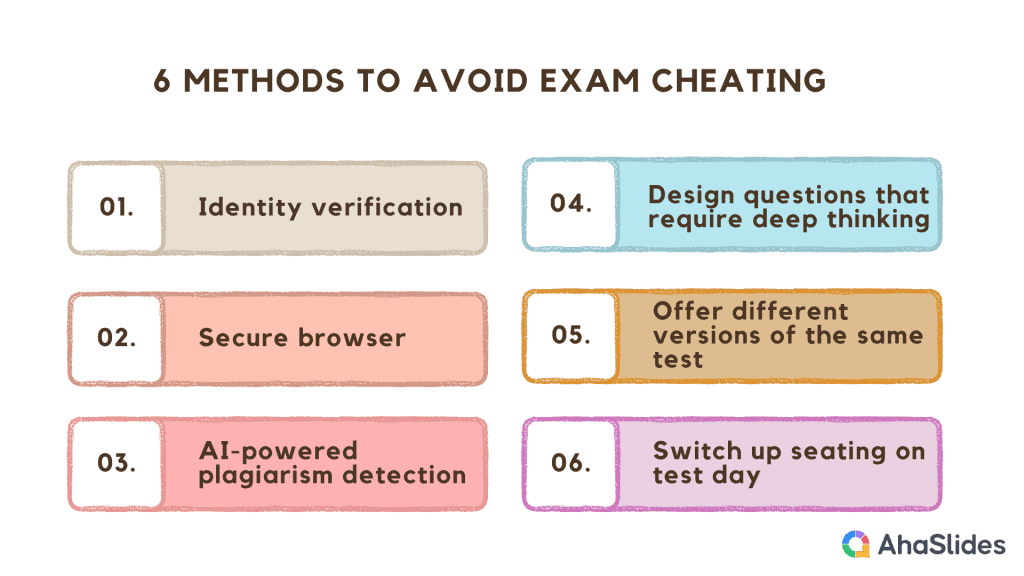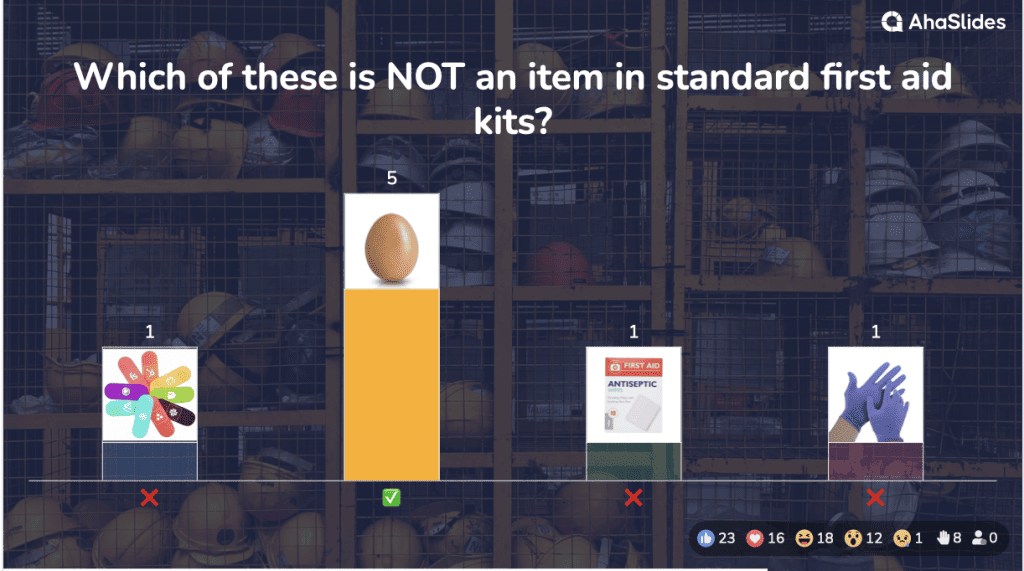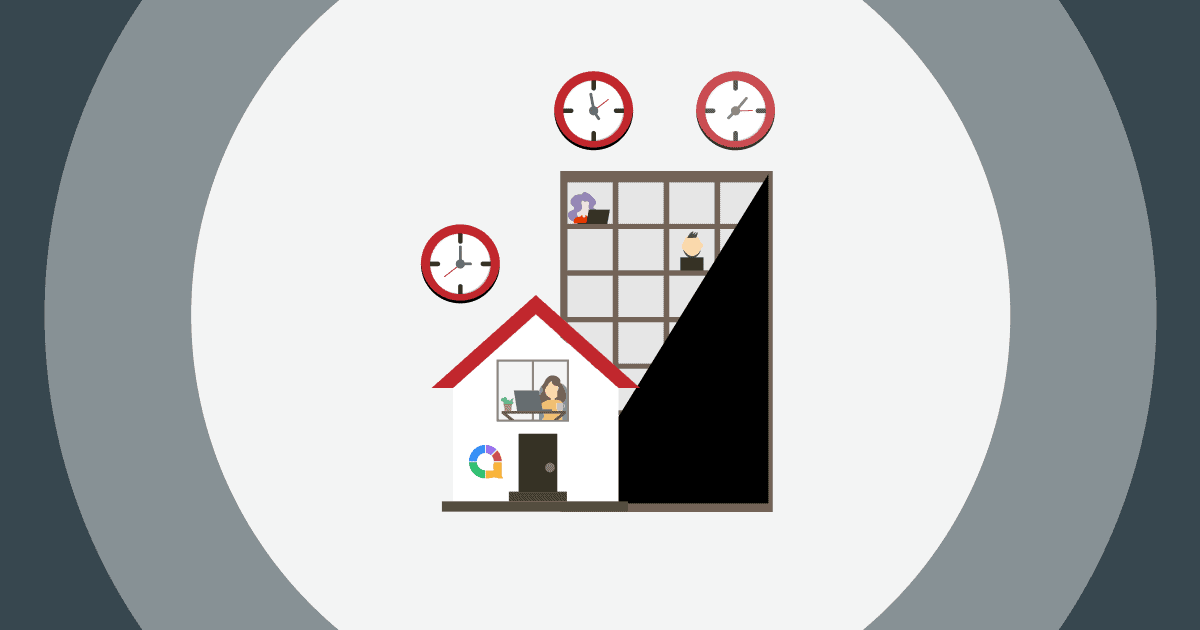Exam cheating. It is morally wrong but why do learners keep doing that?
It can be fascinating how creative students are when it comes to exam cheating. From traditional paper exams to remote exams, they always find out an effective way to cheat.
When Chatbot AI like Chat GPT shows its advantages to help students to solve exam questions of many kinds, a rising institution's concern about exam cheating becomes more pronounced.
For both learners and educators, it is time to rethink exam cheating as it is a multifaceted issue that demands a collective effort.
In this article, we provide you with the root causes of exam cheating and how an individual can stop cheating on tests and the latest method for instructors to prevent exam cheating.

Table of Contents
- Why do people cheat in online exams?
- What is an example of cheating on exams?
- How can we avoid exam cheating?
- How do I stop cheating on online tests?
- Key Takeaways
Why do people cheat in online exams?
There are several reasons why cheating is still increasing in online exams though many online proctoring tools have been installed to catch cheating on tests.
Lack of Preparation: The most common reason for exam cheating is lack of preparation. Insufficient time or inadequate study, and poor learning ability lure some students into affairs.
Anonymity: In online exams, students are more likely to cheat when they feel anonymous in class without no one paying attention to them.
Convenience: The increasing availability of digital testing and online resources has made it easier for students to access cheating materials that weren’t always so readily available in the past.
Academic Pressure: For some, it’s a shortcut to gain an advantage over their peers, give them the scores they feel they need to get into the college of their choice or secure valuable scholarships.
Peer Pressure: Not only is the technology used to facilitate cheating becoming more accessible, but the desire to meet the expectations of peers, family and society also puts added pressure on students to excel - even if it means taking the easy way out.

What is an example of cheating on exams?
Cheating on tests is like stepping into the shadows, a path that leads away from true learning and personal growth. Cheating on exams takes many forms, and here are 11 common examples of exam cheating:
- Using Hidden Notes: Illegally looking at notes or cheat sheets during the exam.
- Exam copying: Cheating by copying answers from classmates.
- Online Searches: Using the internet to find answers during an online exam without permission.
- Fake IDs: Using fake identification to impersonate someone else and take the exam on their behalf.
- Sharing Answers: Giving or receiving answers from others during the exam.
- Pre-Written Answers: Bringing pre-written answers or formulas and copying them onto the exam paper.
- Plagiarism: Submitting work that is not entirely one's own, whether it's from published sources or other students' assignments.
In addition, high-tech exam cheating has become a growing concern as technology continues to evolve. Some examples of high-tech exam cheating include:
- Smart Devices: Using smartwatches, smartphones, or hidden earpieces to access unauthorized information during the exam.
- Cheating Apps: Downloading and using specialized apps that provide answers or access to study materials during the test.
- Remote Assistance: Using video conferencing or messaging apps to communicate with others for answers or support during the exam.
- Screen Sharing: Sharing screens or using multiple devices to collaborate with others and receive help with exam questions.

How can we avoid exam cheating?
It is essential that schools and other academic institutions create an environment where dishonest and unethical behaviour is not accepted in any form.
Not only does this create a space wherein students don’t feel pressured to cheat but also helps reinforce an ethical atmosphere of integrity among learners by using certain strategies and online proctoring.

Identity verification
Secure authentication systems such as multi-factor authentication and biometric scans can be used to personalize the tests and guarantee that the right student is actually the one doing the test.
Utilizing biometric scans like facial recognition and fingerprints will ensure test-takers can’t get away with trying to deceive the system.
Secure browser
A secure browser is a great way to keep online exams safe. It prevents cheating by not allowing students to switch to other apps or change the size of the browser.
After the exam, the browser creates reports with pictures that show any suspicious behaviour, like moving the head too much, having banned items nearby, or having more than one person in the picture. This helps ensure that the exam is fair and everyone follows the rules.
AI-powered plagiarism detection
Advanced AI-powered plagiarism detection tool is a cutting-edge technology that uses artificial intelligence to identify instances of plagiarism in cheating in exams essay.
It analyzes the content of essays, papers, or any written material and compares it to a vast database of existing texts to spot similarities or copied content.
Design exam questions that require higher-order thinking
According to Bloom (1956), instead of asking students simple questions that can be easily answered by searching the web or flipping through their textbooks, craft questions that challenge them to analyze, synthesize, and evaluate information. By doing so, you'll stimulate their critical thinking skills and foster a deeper understanding of the subject matter.
Offer different versions of the same test
To avoid exam cheating, consider providing various versions of the same test and its extensive strategies as follows:
- Testing sequences can also be randomized so that answers can’t be shared without getting noticed.
- Create multiple variations of the test with different question orders and content, which reduces the likelihood of copying answers from others.
- Employ a dynamic question bank system that generates questions randomly from a pool of diverse items.
- Instead of using closed-ended questions, add more open-ended questions that require thoughtful responses.
Switch up seating on test day
If your exams are held in the same classroom as learning, it is likely for students to copy each other's answers. To prevent this phenomenon, teachers can assign students to sit in a different place than their regular seat.
How do I stop cheating on online tests?
Let's be honest, cheating sometimes helps you get a higher score, but it's a hollow victory that doesn't last long. Something that doesn't belong to you will never truly belong to you.
In the pursuit of knowledge and growth, let us choose the path of honesty and integrity. Remember, the road to greatness is paved with the bricks of hard work, sincerity, and genuine understanding.
Here come with 5 ways to help yourself to stop cheating on online tests and compromising academic integrity:
- Delve deep into your subject: Immerse yourself in the vast sea of information available, from textbooks to research papers and online resources. Allow your thirst for knowledge to propel you forward.
- Practice Time Management: Learn to manage your time effectively during exams. Allocate sufficient time to each question, and avoid feeling rushed, which may tempt you to cheat for quick answers.
- Find Mentors and Guides: Don't be afraid to reach out for assistance when you encounter challenging concepts. Seek help from teachers, peers, or online resources to deepen your understanding.
- Use Practice Tests: Incorporate practice tests into your study routine to assess your knowledge and identify areas that need improvement. Review your practice test results and learn from any mistakes you made. Addressing weaknesses will strengthen your knowledge and boost your confidence.
- Create a Study Plan: Define your academic objectives and set clear goals for yourself. Then, develop a structured study plan that includes regular practice and review sessions. This will help you stay on track with your learning and build a solid foundation of knowledge.
Related:
- Honey And Mumford Learning Styles | 2025 Guide
- Visual Learner | Practice Effectively in 2025
- Kinesthetic Learner | Best Ultimate Guide in 2025
- 8 Types of Learning Styles | Strategies for Effective Learning
Key Takeaways
It is worth noting that cheating may offer temporary advantages and short-term gains, but it hinders personal growth and undermines the real purpose of education. There is no better way than staying committed to learning and achieving through your hard work and dedication.
For educators and learners, the effective learning and teaching process is important for individuals to absorb knowledge, put it into practice, and definitely prevent exam cheating.
If you are wondering how to create an engaging and compelling learning and teaching experience, check out AhaSlides right away to get more inspiration. We are an interactive and collaborative online presentation tool with a mission to transform the way knowledge is shared and fascinated.
With AhaSlides, educators can captivate learners with live quizzes, polls, and engaging presentations that make learning fun and memorable.

Ref: Protocexam | Witwiser | Aeseducation








